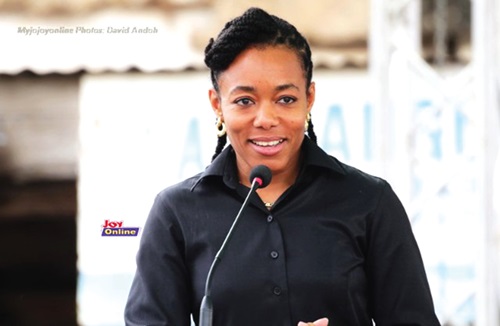
Ghana’s Parliament must be safe space for women
Parliament is meant to be the highest institution of democratic representation in Ghana, at the forefront of the quest to uphold justice, equality and national progress.
However, recent incidents raise concerns about whether Ghana’s Parliament is truly an inclusive and safe space, especially for women.
At a time when the Affirmative Action Bill has been passed, the increasing reports of hostility, intimidation, and inappropriate behaviour toward female parliamentarians highlight a deeper issue, one that threatens to discourage women from participating fully in governance.
Over the years, Parliament has witnessed multiple instances of gender-based verbal and physical misconduct.
Advertisement
On February 4, 2025, Dr Zanetor Agyeman-Rawlings was subjected to a personal and deeply offensive attack on the parliamentary floor.
An MP hurled the words, “Sit down, you daughter of a murderer,” at her during a debate.
This comment was not only unprofessional but also unprovoked.
Parliamentary debates should focus on policy and national issues—not personal attacks rooted in malice and prejudice.
Such remarks only serve to create a toxic environment that discourages open discourse and alienates female representatives.
One of the most disturbing incidents occurred in 2019 when Ursula Owusu-Ekuful was physically harassed by male MPs during a heated parliamentary session.
Video footage showed her being aggressively pushed in an environment where she should have been safe and respected.
Such behaviour in Parliament not only undermines the dignity of women but also sets a dangerous precedent for how female leaders are treated in national politics.
Another recent incident that raises serious concerns is the reported altercation between Majority Leader Afenyo-Markins and a parliamentary clerk.
He not only verbally assaulted the clerk but also exhibited a behaviour that was described as aggressive and inappropriate for a leader of his position.
If such acts of intimidation and aggression are not addressed, they risk fostering a culture of impunity where misconduct is normalised within the institution meant to lead by example.
The cumulative effect of these incidents is deeply concerning.
Parliament is not a space for crude, sexist and inappropriate ‘locker-room-style misogyny’.
It is a place where national policies are debated with civility and decorum.
If women who constitute more than half of Ghana’s population do not feel safe or respected within this space, how can the country claim to uphold the principles of equality and democracy?
The Impact on Women’s Participation in Politics
Forty one out of 275 Members of Parliament (MPs) are women, representing approximately 14.91 per cent of the total composition.
This figure remains significantly lower than the recommended 30 per cent gender representation benchmark set by the Inter-Parliamentary Union (IPU) for achieving gender balance in governance.
Hostility towards women in Parliament extends beyond the individuals directly involved.
It sends a discouraging message to young women across the country who may aspire to enter politics.
It tells us that the highest law-making body in the nation allows women to be harassed and heckled with impunity.
Historically, many women hesitate to enter politics for fear of harassment, verbal abuse, and an environment that does not support their leadership.
A nation cannot claim to be a true democracy when half of its population is unwelcome in its most important political space.
The Need for Reform
To make Parliament a safe and inclusive space for women, immediate and deliberate action is needed. Some steps that should be taken include:
Enforcing strict disciplinary measures
Parliament must take a firm stance against verbal abuse, harassment and intimidation. Clear disciplinary measures should be enforced against MPs who engage in such conduct.
The Parliamentary Privileges Committee must hold members accountable and ensure that acts of misconduct are met with serious consequences.
Establishing stronger codes of conduct
While Parliament has rules of engagement, they must be strengthened to explicitly address gender-based harassment and discrimination. Training sessions on gender sensitivity and professional conduct should be mandatory for all MPs to foster a culture of respect.
Creating safe reporting mechanisms
Female MPs and parliamentary staff should have a safe and confidential way to report cases of harassment or discrimination. An independent oversight body should be established to handle complaints and ensure fair investigations without political interference.
Promoting women’s political participation
Political parties and civil society must work together to create a more supportive environment for women in politics. Initiatives such as mentorship programmes, campaign support, and policies promoting gender equality in party structures will encourage more women to enter Parliament.
Holding leadership accountable
The Speaker of Parliament and other parliamentary leaders must take responsibility for fostering a culture of respect.
They must publicly condemn misconduct and take decisive action when such incidents occur. Silence in the face of wrongdoing only enables further violations.
A Call for Change
Ghana has made significant strides in democracy, but true progress is measured by the inclusivity and fairness of its institutions.
Parliament must set the highest standard for conduct, professionalism and respect.
It should not be a place where women feel threatened, belittled, or unsafe.
If Ghana is serious about democracy, it must create a Parliament where all voices—regardless of gender—are valued and protected.
A nation that silences and mistreats its women in leadership cannot claim to be just. It is time for Parliament to take concrete steps towards change.
Ghana deserves better.
Women in leadership deserve better. Parliament must do better.
The writer is a Communications Professional
Email: nuongg@outlook.com
